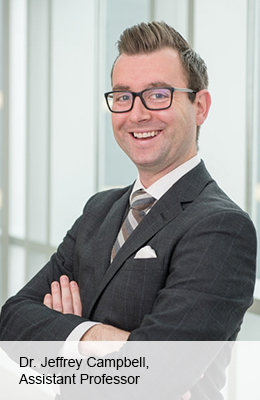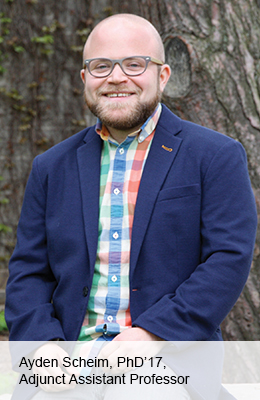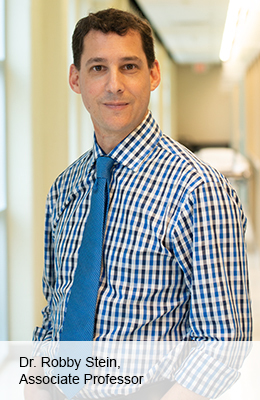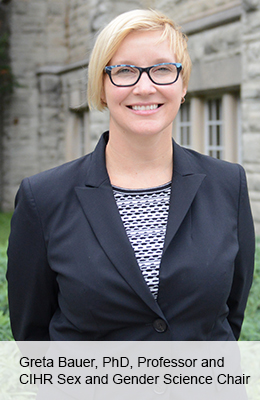Opening the door: Creating trans-inclusive spaces in research and medicine

Researchers at Schulich Medicine & Dentistry are focused on the health and well-being of trans and non-binary people. Working in collaboration with diverse communities across the country, they are striving to empower educators, inform policy and improve access to care
By Emily Leighton, MA’13
When Greta Bauer, PhD, submitted her first grant proposal to the Canadian Institutes of Health Research (CIHR) 15 years ago, she had to convince reviewers that the research team was going to survey more trans people than should exist in Ontario.

Research data at the time estimated there should be about 550 trans individuals in the entire province. This, despite one health clinic in Toronto caring for as many patients as the data suggested.
“When I first started this work, there was so much invisibility,” said Bauer, Professor and CIHR Sex and Gender Science Chair. “People didn’t understand the importance of doing research or implementing inclusive policies because they imagined that trans people were so vanishingly rare; that trans people were not going to come into their clinical practice, or work with them, or even be their doctor.”
Bauer is part of a team of researchers at Schulich Medicine & Dentistry focused on the health and well-being of trans and non-binary people. Working in collaboration with diverse communities across the country, they are striving to empower educators, inform policy and improve access to care.
A 2019 national survey revealed nearly half of all transgender and non-binary Canadians who responded have had one or more unmet health care needs in the past year, and 12 per cent avoided the emergency room, despite needing care.
The results reflected what many people already knew. “Community knowledge of this existed long before we documented it,” explained Bauer. “Within the trans community, everyone knew this was happening.”
The Trans PULSE Canada survey, led by Bauer and Ayden Scheim, PhD’17, Adjunct Assistant Professor, Epidemiology and Biostatistics, collected data from nearly 3,000 participants. Survey questions addressed mental, physical and psychological health, as well as access and barriers to care.

“We wanted to capture the experiences of trans people as a community or population, not as a patient group,” said Bauer. “People are in contact with the medical system only at particular points in their life, and they may not be at all with regard to their gender. There is a broader group of people whose health is being impacted through social exclusion and that aspect of trans health was not being captured.”
The Trans PULSE Canada team identified nine priority populations: older people, youth, sex workers, non-binary people, immigrants, those living with disabilities, Indigenous genderdiverse people, racialized people and those in rural or remote areas.
“We wanted to be able to look at differences in trans and non-binary health within communities depending not only on where they are living but also based on the intersecting identities or experiences they have,” said Scheim.
To date, the project team has published six reports detailing the survey data. The latest report, published in June 2021, focuses on trans and non-binary youth between the ages of 14 and 24. Among respondents, one in five had avoided schools in the past five years for fear of harassment or outing.
“Strategies should consider how to promote supportive environments at home and at school, as social support from family and friends protects trans youth against mental health issues, even in the face of discrimination and stigma,” recommends the report.
Most trans people recognize their gender at a young age – research shows that 80 per cent know their gender is different by age 14.
Trans Youth CAN!, a cohort study involving 10 clinic sites across Canada, is looking at the health experiences of youth from puberty to less than 16 years of age who are accessing gender-affirming care, including puberty blockers and hormones.
The study follows participants for the first two years they attend the clinics, gathering data from a variety of sources, including interviews, surveys and clinical records. The research team is also interested in the well-being of parents, caregivers and families.
“We’re looking not just at the medical and psychological outcomes, but family and social outcomes as well,” said Bauer, co-principal investigator. “For youth at this age, life is really heavily about family and about school – that is much of the context for their lives.”

As part of the survey questions, the research team developed new measures of gender distress and gender positivity, with sub-scales to measure distress or positivity related to the body, differentiated from distress or positivity related to social gender.
“What we’re finding in our initial analysis is that most youth have really high levels of gender distress, but simultaneously have high levels of gender positivity,” said Bauer.
Paediatric endocrinologist Dr. Robby Stein, Associate Professor, is a collaborator on the Trans Youth CAN! study. Five years ago, he developed the Gender Pathways Service at Children’s Hospital, London Health Sciences Centre – a small group of health professionals providing consultation, education, medical and psychosocial support to youth and their families.
The Gender Pathways Service follows the World Professional Association for Transgender Health’s Standards of Care, which provide clinical guidance for health professionals to assist transgender and gender-nonconforming people.
“The study is an opportunity to shine a light on trans youth,” said Stein. “To provide education to health care workers, to staff and counsellors at schools and to families around barriers to care and other supports that are needed, as well as to advocate for better resources so we can provide more timely and comprehensive care.”
Another project, recently funded through the School’s Collaborative Research Seed Grant program, is exploring the health care experiences of trans people in the London region. The qualitative research study will engage focus groups to discuss challenges and expectations for care, as well as how to best incorporate education and training into clinical settings.
“We know the current system is hard to navigate, and we want to design a more inclusive system that trans people can access efficiently and comfortably,” said co-investigator Dr. Jeffrey Campbell, Assistant Professor.
As a urologist, Campbell sees trans patients regularly in his work, and has encountered challenges in connecting patients to resources or making referrals to other specialties. The multidisciplinary research team includes faculty members from Plastic and Reconstructive Surgery, Obstetrics & Gynaecology, Urology and Endocrinology. “As specialists with a common interest, it’s essential that we work together to optimize care and training,” said Campbell.

Also focused on training, a group of medical students at the School is evaluating the delivery of sexual and gender minority content in medical education programs across Canada. Under Bauer’s supervision, they are interviewing curriculum offices across the country and conducting surveys among medical students. The project was recently funded through a Faculty Support for Research in Education grant from Schulich Medicine & Dentistry.
One of the topics being explored is the presentation of sexual and gender orientation in case scenarios and whether it relates to the health condition under study. “We hear about trans people experiencing what they call ‘trans broken arm syndrome’,” explained Bauer. “Whenever they go to the doctor, it’s always going to be about being trans, even if they come in with a broken arm.”
After more than a decade working with trans communities, Bauer does see a greater awareness in research, something she has supported by helping develop trans-inclusive survey measures on sex and gender.
“There’s been a move to start incorporating trans people more explicitly in research,” she said. “Researchers have realized their questions were not inclusive and because of that, people weren’t finding a place to put themselves – contributing to social exclusion as well as unclear data.”
There has also been progress on the publishing front, with trans health research now appearing in a broad range of peer-reviewed journals.
Human rights policies, too, have seen changes, and Bauer’s initial work with Trans PULSE Ontario, a precursor to the national project, supported changes to identity markers on official documents.
“There is now a recognition that trans health issues are important and that trans people have been excluded from health care systems in some pretty serious ways,” she said.








